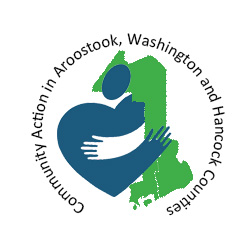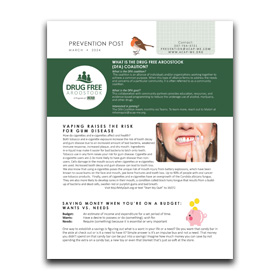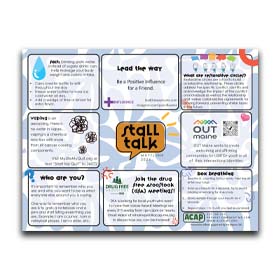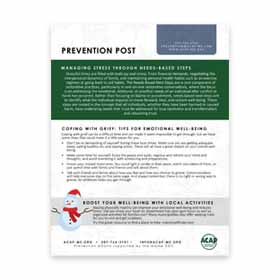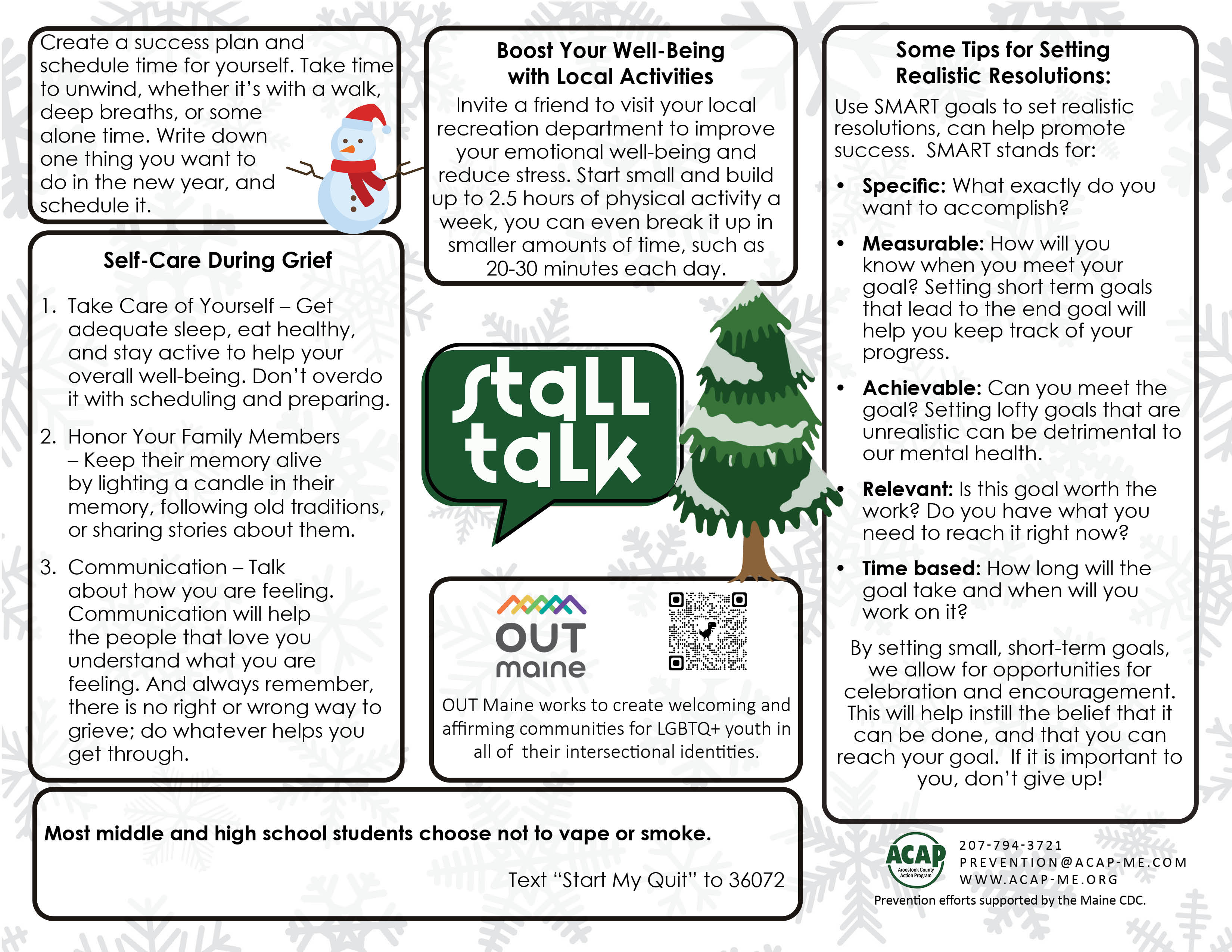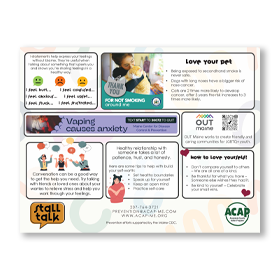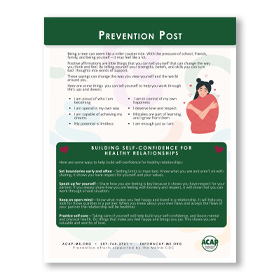
Prevention & Wellness
We build a stronger, healthier community by partnering with local and statewide organizations to offer prevention services that focus on nutrition, oral health, substance use, tobacco, obesity, and youth engagement.
More About Our Services

Dispose of unwanted or unused mediations at any Aroostook County Police Department. For details and times of when medications can be dropped off contact your local station. A full list of Maine Police departments and contact information can be found at: http://mainechiefs.com/police-departments
Medications can also be dropped off at select pharmacies, visit the Diversion Control Division Website.
View a current list of Inmar Drug Take Back Boxes at: https://safemedicinedrop.com/locations/maine/
Additional Resources about drug disposal, drug information, data & statistics, recovery resources can be found at:

Breakthrough Youth is a 25 hour curriculum of four evidence-informed and/or evidence based programs designed to help youth:
- Explore career opportunities
- Develop soft skills necessary for workplace leadership and success
- Gain skills to make responsible decisions about substance use to prevent misuse/abuse
- Gain financial literacy
- Learn how using safer sex practices/contraceptive use prevents unwanted pregnancies and/or STIs
- Create a sense of community
Programs will include:
- Soft Skills to Pay the Bills
- Money Smart for Young Adults
- Prime for Life
- Making Proud Choices

Provides the equipment necessary for WIC enrolled women who are breastfeeding to support their return to work or school. Electric breast pumps are available for loan to those needing this support.

Provides education and support to WIC enrolled women who are breastfeeding.

Evidence-based cirriculum to build resiliency available to schools, clubs, and other organizations that serve youth. Free programing includes: substance use prevention, media literacy, restorative practices, and respectful conversations.

County Restorative Practices (CRP) provides RP support and training to schools and organizations across Aroostook County and provides RJ diversion for justice-involved youth in Washington and Aroostook Counties.
Restorative Practices (RP) refers to the long-established, varied and global community-based traditions - inspired by indigenous ways of being - which value voice, choice, fairness and dignity for all. It covers a broad range of processes all of which make space for feelings and needs, for mutual support and mutual accountability. Examples include community building practices such as facilitated circle-based sharing to strengthen relationships, plan, grieve or celebrate; these can take place within family groups, community groups, schools or residential settings - or anywhere that people come together for the purpose of support or healing, solution-seeking and peace-keeping. Restorative Practices also include harm repair processes, such as conferences of truth and reconciliation, mediation, and accountability circles. And restorative practices encompass reintegrative practices, namely welcoming individuals as they return to community and plan for inclusion and success.
Restorative Justice (RJ) refers specifically to the application of Restorative Practices in response to instances of harm. It prioritizes understanding and repairing harm within relationships among people, rather than responding to violations of rules or laws. Restorative justice is centered on the needs of the person(s) who were harmed, those who caused harm and of the community of people who were affected. A restorative justice process offers the opportunity for those who were most centrally affected to generate an agreement specifying how things will be made right and how to reduce the likelihood that something similar might occur in the future in ways that are both measurable and action-oriented.

This collaboration with community partners provides education, resources, and evidence-based programming to reduce the underage use of alcohol, cannabis, and other drugs.

The Maine Prevention Network (MPN) Initiative is a statewide program funded by the Maine Center for Disease Control and Prevention, working to reduce and prevent the negative health effects from tobacco use, substance use, and obesity, increase youth engagement and empowerment at the Local level through a coordinated effort.
The MPN Obesity prevention effort focuses on improving health outcomes through Healthy Eating and Active Living (HEAL) strategies including: supporting access to and awareness of healthy eating, increasing awareness to and access to physical activity, supporting communities and worksites to become breastfeeding friendly, making the healthy choice the easy choice.

Provides free assistance from Certified Healthcare Navigators with all aspects of Maine’s Health Insurance Marketplace, including determining eligibility, comparing, and explaining options, and applying and enrolling in coverage.

Provides clinical assessments, oral prophylaxis, fluoride treatments, sealants, referrals, and oral hygiene instruction to children enrolled in WIC and Head Start programs and at local contracted public schools in Aroostook County. MaineCare and private fee payment accepted.

Provides education to people of all ages throughout Aroostook County in cooperation with other social service and health care providers. Coordinates a consolidated School Oral Health Program and is a resource for oral health programs in all elementary schools in Aroostook County. Administers a Dental Sealant Program for second and third grade students in every Aroostook County elementary school. Maintains an extensive lending library that includes audiovisual materials, books, and teaching aids.

A collaboration with the Maine Prevention Network, a division of the Maine CDC, to educate youth on the dangers of substance misuse, and to provide community resources and education regarding addiction and harm-reduction. Community educators work to implement evidence-based prevention programming for substance use and youth engagement and empowerment.

Through partnerships with the Maine Cancer Foundation and Drug Free Communities, we support people throughout Aroostook County in ending tobacco use. Not on Tobacco (N-O-T) is a youth-centered treatment program for ages 14 – 19 that addresses all types of tobacco products including e-cigarettes. Freedom From Smoking is a program for tobacco users who are ready to quit. Participants are six times more likely to be smoke free one year later than those who quit on their own.
Free & Convenient Help is Available to individuals age 14 and older:
- Quit Kits
- Virtual Meetings
- Help making a quit date plan
- Connection to Free Nicotine Replacement Therapies

A team of partners working in collaboration with the Maine Prevention Network, a division of Maine CDC, to educate youth on the dangers of nicotine, provide quit resources for those experiencing nicotine addiction, and to promote and assist public facing entities with policy implementation and updates. WE are here to help YOU!

Prenatal vitamins are provided to any woman in their childbearing years free of charge.
Provides nutrition education and screening to eligible pregnant and postpartum women, nursing mothers, infants, and children under five years of age. Extended family members or foster parents raising young children are also encouraged to apply.
Nondiscrimination Statement
Need help with language assistance?
If you have a disability or difficulty with English, free language assistance, aids, and services are available. Contact your Local WIC Clinic agency to learn more.
Federal
In accordance with federal civil rights law and U.S. Department of Agriculture (USDA) civil rights regulations and policies, this institution is prohibited from discriminating on the basis of race, color, national origin, sex, disability, age, or reprisal or retaliation for prior civil rights activity.
Program information may be made available in languages other than English. Persons with disabilities who require alternative means of communication to obtain program information (e.g., Braille, large print, audiotape, American Sign Language), should contact the responsible state or local agency that administers the program or USDA's TARGET Center at (202) 720-2600 (voice and TTY) or contact USDA through the Federal Relay Service at (800) 877-8339.
To file a program discrimination complaint, a Complainant should complete a Form AD-3027, USDA Program Discrimination Complaint Form which can be obtained online (PDF), from any USDA office, by calling (866) 632-9992, or by writing a letter addressed to USDA. The letter must contain the complainant's name, address, telephone number, and a written description of the alleged discriminatory action in sufficient detail to inform the Assistant Secretary for Civil Rights (ASCR) about the nature and date of an alleged civil rights violation. The completed AD-3027 form or letter must be submitted to USDA by:
Mail: U.S. Department of Agriculture
Office of the Assistant Secretary for Civil Rights
1400 Independence Avenue, SW
Washington, D.C. 20250-9410; or
Fax: (833) 256-1665 or
(202) 690-7442; or
Email: program.intake@usda.gov
This institution is an equal opportunity provider.
State of Maine
In addition to the Federally protected classes, the State of Maine also protects individuals from discrimination based on creed/religion, and sexual orientation.
To file a complaint of discrimination with the State of Maine, visit the Maine Human Rights Commission
MAKE A DONATION TODAY!
Invest in Our Community
Thank you for your interest in supporting ACAP programs and services! As a leader, or in partnership with others, ACAP provides guidance to the community in responding to emerging human needs in the areas of community, family, energy and housing, and workforce development services.
